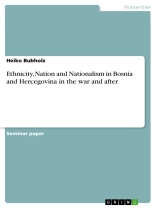Seminar paper from the year 2002 in the subject Sociology – Culture, Technology, Nations, grade: 1.0 (A), Jagiellonian University in Krakow (Centre for European Studies), course: Nationalism, Minorities and Ethnicity in Central Europe, language: English, abstract: I remember December 1, 1997, as a crucial and so far one of the most important days in my life. This was the day I left for Bosnia and Herzegovina to become a member of the SFOR Peacekeeping Mission. Today on December 1, 2001, I look back to this first adventure of my life. Still I am trying to figure out what caused these cruel deeds and this furious devastation of a whole and formerly relatively prosperous country. Things I could see and experience there brought up to me the idea to discuss the initial reasons for this particular war, which had become one of the bloodiest events in Europe’s contemporary history. Despite all the subsequent crises in the region, an area known throughout history to be cause of numerous conflicts and wars – as BISMARCK once said being not worth the bones of one of his soldiers1 – it might be further deserving to devote the later part of this paper discussing the actual setting and feasible future deve lopment. Literature gives a broad overview of political explanations for the conflicts in former Yugoslavia, which became frequently apparent during the last years and crises. Despite the fact, that in the media the terms ethnicity and nationalism was used extensively, there are only few attempts to explain the pre-war situation by these phrases. Therefor the objective of the following chapter will be a clarification of the terms in regard to the particular situation in Bosnia and Herzegovina shortly before the war. In conclusion it might be suitable to make some remarks on the actual situation regarding the ethnical combination as well as the impact of refugee migration on the territory of the country in comparison to the pre-war status and the persuading outcomes eventually resulting out of this.
However, the observer should be aware, that the examinations often lack discreet evidence; in the words of NASH: “But even this phrasing of the search for universals in group loyalties and boundary maintaining mechanisms is difficult to spin into empirical relevant sentences”2. This proves much more valid in regard to the fragmentary settlement and diversity of the respective ethnicity in the pre-war Bosnia (see also the attached map of 1991 census).
[…]
______
1 Bismarck (1922).
2 Nash (1989), p. 4.
Heiko Bubholz
Ethnicity, Nation and Nationalism in Bosnia and Hercegovina in the war and after [EPUB ebook]
Ethnicity, Nation and Nationalism in Bosnia and Hercegovina in the war and after [EPUB ebook]
Bu e-kitabı satın alın ve 1 tane daha ÜCRETSİZ kazanın!
Dil İngilizce ● Biçim EPUB ● Sayfalar 37 ● ISBN 9783638133838 ● Dosya boyutu 1.7 MB ● Yayımcı GRIN Verlag ● Kent München ● Ülke DE ● Yayınlanan 2002 ● Baskı 1 ● İndirilebilir 24 aylar ● Döviz EUR ● Kimlik 3480855 ● Kopya koruma olmadan












